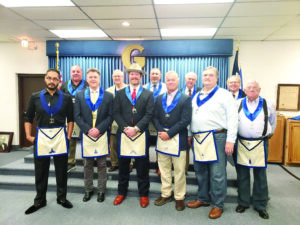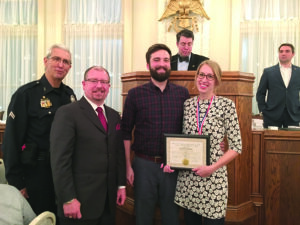By Judy Babb
For Elui Enrique Paredes, joining the East Dallas Masonic Lodge #1200 was an easy decision. Then 26, Paredes, now a 10-year member, recalled his days in college as a member of a Latino fraternity Sigma Lambda Beta. After graduation from the University of Texas Dallas, he knew he needed to be a part of a group of men who bonded, provided connections with the community and helped others.

Photos courtesy of the East Dallas Masonic Lodge #1200
He’s proud of his membership and of what the group accomplishes. “We’re here to make this world a better place,” Paredes said. That’s one of the big differences between a college fraternity and the Fraternal Order of Masons. “I feel like belonging to something that builds value is important,” he said. “Giving back is important to me.” He called the group serious — not that there isn’t plenty of camaraderie and laughter at Tuesday dinners. The 6 p.m. meals cooked by steward John T. Williams are open to non-members. The meetings are not.
Paredes and the approximately 30 members of the lodge are celebrating the lodge’s 100-year anniversary June 14 with a dinner at the lodge.
Currently, Paredes serves as webmaster but, during his tenure, he was a leader, someone who helped grow the lodge even as membership worldwide dwindles. He held the top post at the lodge of Worshipful Master. He was the first millennial to join and to hold the position. The title is one of respect.
The lodge’s website describes what Freemasonry is and what it isn’t. It is a fraternity and membership is restricted to men. Unlike many college fraternities, hazing isn’t a part. “The Masonic Order is a serious group,” the website states. “It exists to take good men and help them to become better men. It is not a reform society. It does not exist to reform criminals, nor would such persons benefit from its teachings.”
Paredes was the first millennial to join Lodge #1200, but he is not the only one now. Men can join once they turn 18. Currently men in their 20s through 70s are part of the lodge. The oldest is 95-year-old John Walton Kirkley.
Current Worshipful Master David Yarbrough was a friend and worked with Paredes. Hearing him talk about his lodge piqued his interest. Paredes invited him to a dinner. Yarbrough ended up submitting a petition to become a member. He said seeking membership is as simple as, “To be one, ask one.” Masons may talk about the group and what good it does, but men who are interested must take the initiative.

The Masons are steeped in secrecy, which has made some equate them with some negative ideas, including they are part of the dark web, Paredes said.
“It is not a secret organization,” Paredes said. “It’s an organization with secrets.”
Membership is divided into three levels: Entered Apprentice, Fellow Craft and Master Mason. At each level, the member must learn and enact a “drama.” Only members are present, and the dramas are kept secret. They are sequential and provide moral instruction and taking on an “obligation.”
Freemasonry is the oldest surviving fraternal organizations in the world. The exact date of its founding is uncertain. Originally, the group was made up of men who were stone masons, which explains the wearing of aprons at meetings. These aprons would have held the tools of stone masonry. At meetings, members wear a plain apron while officers wear aprons that, through symbols, tell their position in the group. Sometime between 1390 and 1717, the masons began to accept members who were not stone masons. Many well-known Americans have been Masons. Among them are Paul Revere, George Washington, Andrew Jackson, Theodore Roosevelt, Douglas MacArthur, Franklin D. Roosevelt, Harry Truman, Stephen F. Austin and Sam Houston. Fourteen presidents have been Masons.
Freemasonry started in Texas in 1835. Now, more than 900 lodges exist in Texas and more than 122,000 members belong to those lodges. Members have to be accepted. The three requirements are a belief in a Supreme Being and in life after death, being a man of good character and “meeting on the level” — living and being a man of character in all that he does. While the group reveres religious beliefs, religion and politics are never discussed at meetings.
Yarbrough explained what membership means to him. “Masonry is about brotherhood and being able to meet with people to form a friendship based on giving back to our communities,” Yarbrough said. “It’s all about charity and giving back to our fellow man.”
In the United States, Masons donate $2 million every day. Lodge #1200 does its part. At the start of each school year, the lodge takes 300 Fantastic Teeth kits to give to low income first graders in its area. Involvement with schools continues. The lodge gives a $2,500 scholarship to a needy student from Woodrow Wilson High School. They raise money through a pistol shoot competition, auctions and the annual dues. They also donated $5,000 to the White Rock Center of Hope, providing assistance for families in crisis, and to Dallas Center, a nonprofit that assists infants, children and adults with developmental differences.
The outreach to the community continues with frequent pancake breakfasts and hosting blood drives with Carter Blood.
For the 100-year-old lodge, doing good is what it is all about. For Paredes and Yarbrough, it’s about continuing a legacy and growing membership.
